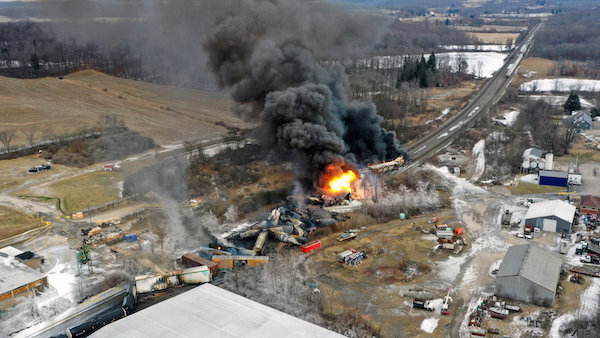New legislation, S. 576, by Senators Sherrod Brown (D-Ohio) and J.D. Vance (R-Ohio), would require that freight trains be inspected before departure after the National Safety Transportation Board in a preliminary report found a faulty wheel bearing caused a train derailment in East Palestine, Ohio in February, spilling toxic chemicals into the city.
Of course, Federal regulations enacted in 1980 and 2008 already provide for pre-departure and periodic inspections of trains, including “Broken or extensively cracked wheel” or “Any other apparent safety hazard likely to cause an accident.” And why wouldn’t federal regulations already say that?
Additionally, the National Safety Transportation Board is still conducting its investigation, including a look at Norfolk Southern’s “railcar inspection practices”: “The NTSB’s investigation is ongoing. Future investigative activity will focus on the wheelset and bearing; tank car design and derailment damage; a review of the accident response, including the venting and burning of the vinyl chloride; railcar design and maintenance procedures and practices; N.S. use of wayside defect detectors; and N.S. railcar inspection practices.”
In its most recent findings on March 2, the Board noted that it “discovered that three of the examined derailed vinyl chloride tank cars were manufactured in the 1990s with aluminum protective housing covers”.
It added in the update, “NTSB is conducting a safety investigation to determine the probable cause of the derailment and issue any safety recommendations, if necessary, to prevent future derailments. The NTSB can also issue urgent recommendations at any point during the investigation.”
And again, on March 21, twenty days after Congress introduced its legislation, the Board issued another important finding, stating, “anomalies with the function of some [Pressure Relief Devices] PRDs that may have compromised their pressure-relieving capability. This will require further testing and evaluation to assess the impact on the operation of the PRDs. According to the manufacturer’s part specifications, one of the installed PRD’s internal spring was coated with aluminum, which is incompatible with vinyl chloride. While aluminum debris from melted protective housing covers entered the PRD discharge areas, no evidence of melted aluminum entered the tank. The NTSB continues to assess if the debris impacted the PRD operation.”
And once again stated, “The NTSB is continuing to conduct a safety investigation to determine the probable cause of the derailment. Additional actions may be recommended to prevent future derailments as the investigation proceeds.”
In other words, the Board has not concluded its investigation yet, and under federal law and regulations, it can and will issue recommendations. Naturally, the Board appears more concerned with finding the cause of the trainwreck than lobbying for new legislation, which, in the text of the legislation, does not mention aluminum coverings or pressure relief devices.
The legislation does look at wheel bearings since, at the time of the bill’s drafting, reports were already available looking at that issue. What this shows is that as the investigation moves forward, there could be other issues that Congress may face unaddressed in a rush to show it is doing something.
Was this a defect with federal law? A regulatory failure to do with the inspections? The wheel bearings? The aluminum coverings? We don’t know definitively yet because the investigation has not yet concluded.
To be certain, federal law under 49 U.S.C. Section 20103 already authorizes the Secretary to “prescribe regulations and issue orders for every area of railroad safety,” a responsibility Congress previously outsourced to the administrative state.
So, how is it that the Board is still reviewing what, if anything, could have been done to prevent the East Palestine derailment disaster and what might have caused it, including any faults with the inspection procedures or faulty equipment, the Department of Transportation already has the authority to change the regulations if necessary, but within a month Congress has already figured it out without any investigation and presumptively has the solution?
Ready, fire, aim! Maybe wait for the Board and the railroads to conclude their investigations before drafting new legislation?
Cross-posted with Conservative Firing Line






